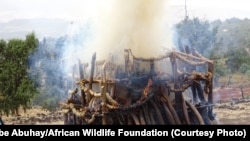Ethiopia is the first Horn of Africa country to publicly destroy its entire stockpile of ivory. In a ceremony on March 20 at the Gulele Botanical Garden in Addis Ababa, the government of Ethiopia burned more than six tons of raw tusks, carvings, trinkets and jewelry.
The African Wildlife Foundation, AWF, commended the government for taking a public stand to save Ethiopia’s remaining elephant population of around 1800. It said Ethiopia is a key hub for the illegal trade of ivory with its major international airport.
African Wildlife Foundation senior communications officer Kathleen Garrigan said Ethiopia’s ivory burning is a significant step towards fighting poaching and trafficking on the frontlines.
“Addis Ababa, the capital city of Ethiopia, is the seat of the African Union. So I think it is very important that this message is zero tolerance for elephant poaching for ivory trafficking, that it comes from Addis. And I think that sends a very strong message to the rest of the continent,” said Garrigan.
“Most of the ivory that was burned today includes raw tusks, carvings, jewelry, chop sticks. Most of this was confiscated ivory. This was ivory that was being smuggled through the country and mostly through the major airport there in Addis,” explained the AWF spokesperson.
A lot of the confiscated ivory had come from other parts of Africa and some was from Ethiopia’s own elephant population.
Garrigan said there have been over 730 arrests made in the country for poaching and trafficking. Last year, over 100 arrests were made at Ethiopia’s international airport. The majority of the ivory traffickers who were arrested were foreigners.
However, Garrigan emphasized that many countries around the world recognize that in order to stop the trafficking, there needs to be a justice system in place where criminals pay for their crimes
“There really needs to be a system of handing down punitive sentences to those convicted of their crime. Now that’s something Ethiopia--per the ivory action plan that it released last year -- recognizes and is trying to tackle. They want to do a thorough analysis of their wildlife laws, amend those where they need to be amended and then take steps to ensure the laws are being enforced by law enforcement, by the judiciary in the country,” Garrigan said.




